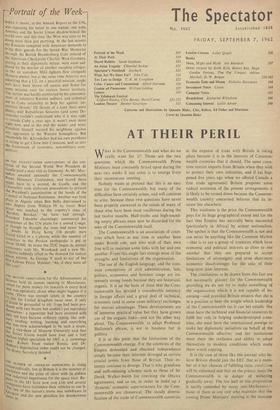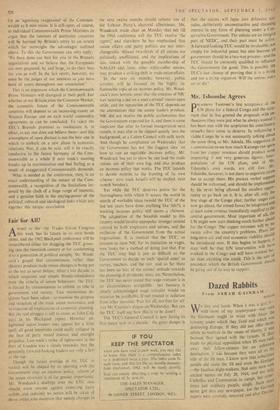AT THEIR PERIL
WHAT is the Commonwealth and what do we really want for it? Those are the two questions which the Commonwealth Prime Ministers must constantly brood upon during the next two weeks if any sense is to emerge from their momentous meeting.
Nobody wants to pretend that this is an easy time for the Commonwealth, but many of the difficulties have certainly arisen, and will continue to arise, because these two questions have never been properly answered in the minds of many of those who have been most vociferous during the last twelve months. Half-truths and high-sound- ing empty phrases must now be discarded for the sake of the Commonwealth itself.
The Commonwealth is an association of coun- tries which have at one time or another been under British rule, and who wish of their own free will to maintain some links with her and one another. From this single fact emerge most of the strengths and limitations of the organisation.
The use of the English language, and the com- mon conceptions of civil administration, law, politics, economics and business usage are im- mensely strong bonds because they are historical, organic. It is on the basis of these that the Com- monwealth has devised a considerable intimacy in foreign affairs and a great deal of technical, economic (and in some cases military) exchanges for mutual, advantages. These developments are of immense practical value but they have grown out of the organic links—and not the other way about. The Commonwealth, to adapt Professor Hallstein's phrase, is not in business but in politics.
It is at this point that the limitations of the Commonwealth emerge. For the countries of the Empire demanded and obtained independence simply because their interests diverged at certain crucial points from those of Britain. Their in- terests continue to diverge. That is why grandiose and well-meaning schemes such as those of Sir Derek Walker-Smith for rewriting the Ottawa agreements, and so on, in order to build up a `dynamic' economic superstructure for the Com- monwealth are chimerical. The steady diversi- fication of the trade of Commonwealth countries
at the expense of trade with Britain is taking place because it is in the interests of Common- wealth countries that it should. The same coun- tries restrict imports from Britain when they wish to protect their own industries, and if (as hap- pened five years ago when we offered Canada a free trade agreement) Britain proposes some radical extension of the present arrangements it is likely to be turned down because the Common- wealth country concerned believes that its in- terest lies elsewhere.
This weakness is the price the Commonwealth pays for its huge geographical extent and for the fact that Empire has naturally been succeeded (particularly in Africa) by ardent nationalism. The upshot is that the Commonwealth is not and can never be anything like the Common Market —that is to say a group of countries which have economic and political interests so close to one another that they are prepared to accept limitations of sovereignty and even short-term economic disadvantages for the sake of their long-term joint interests.
The conclusions to be drawn from this fact are not necessarily gloomy for the Commonwealth providing we do not try to make something of the organisation which it is not capable of be- coming—and provided Britain ensures that she is in a position to bear the weight which leadership of the Commonwealth (as it can be) entails. She must have the technical and financial resources to fulfil her role in helping underdeveloped coun- tries; she must have the international prestige to make her diplomatic initiatives on behalf of the Commonwealth effective; and her institutions must show the resilience and ability to adapt themselves to modern conditions which make them worth copying.
It is the case of those like this journal who be- lieve Britain should join the EEC that as a mem- ber of it her chances of fulfilling these contiitions will be enhanced and that on the preseal basis the Commonwealth is in danger of withering gradually away. The last half of this proposition is tacitly conceded by many anti-Markcieer.; — those of them at any rate who maintain that the coming Prime Ministers' meeting is the moment
for an 'agonising reappraisal' of the Common- wealth as it now exists. It is still open, of course,
to individual Commonwealth Prime Ministers to argue that the interests of particular countries will be harmed by Britain's entry to an extent which far outweighs the advantages outlined above. To this the Government can only reply:
'We have done our best for you in the Brussels negotiations and we believe that the Europeans
are now prepared, by and large, to do their best for von as well. In the last resort. however. we must be the judges of our interests as you have been of yours throughout our association.'
This is an argument which the Commonwealth Prime Ministers will disregard at their peril. For whether or not Britain joins the Common Market, the economic future of the Commonwealth countries will depend to an increasing extent on Western Europe and on such world commodity agreements as can be concluded. To reject the EEC's Brussels promises as inadequate is. in effect, to say one does not believe them—and this atmosphere of open distrust is not the best one in which to embark on a new phase in economic relations. Nor, it can be said will it be exactly conducive to the future harmony of the Com- monwealth as a whole if next week's meeting breaks up in recrimination and bad feeling as a result of exaggerated Commonwealth demands.
What is needed at the conference, then, is an exact understanding of the nature of the Com- monwealth, a recognition of the limitations im- posed by the clash of a huge range of interests, and a genuine faith in the staying-power of the political, cultural and ideological links which join together this unique association.



































 Previous page
Previous page